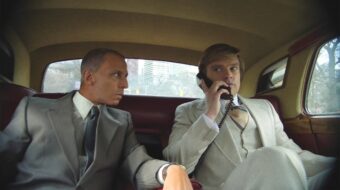
American Fiction is a film that is quick-witted with a sharp tongue. The commentary on the entertainment industry and its perpetuation of harmful stereotypes gets sliced wide open in this new comedy-drama. No one involved in the business of creating best-selling novels and movies is safe from the microscope the film puts them under—not even the kind of people who criticize the system itself. American Fiction manages to deliver hearty laughs and emotional punch while giving nuanced insight into the complexity of race, identity, and consumerism in the United States.
Directed and written by Cord Jefferson, in his directorial debut, American Fiction tells the story of a frustrated novelist named Monk (Jeffrey Wright) who is fed up with the establishment profiting from so-called “Black” entertainment that he believes relies on tired and offensive tropes. In a late-night moment of rebellion, he uses a pen name to write an over-the-top and outlandish “Black” book, leaning on stereotypes of fatherless Black men, impoverished Black people, and hood violence. Monk considers the manuscript a blatant middle finger to the establishment but is very surprised—and initially dismayed—when his book is sold and achieves massive success. Monk is propelled into the heart of hypocrisy and the madness of the entertainment industry that he claims to disdain. The film is based on the 2001 novel Erasure by Percival Everett.
Much is going on in American Fiction, yet shockingly, many explored themes always feel fully fleshed out. Monk is a Black writer and academic who some could argue is too intelligent for his own good. That’s because he’s all too aware of the hypocrisy and bias in society yet feels helpless in changing anything. Ignorance is bliss; since Monk lacks that ignorance, he feels pretty miserable and pissed off.
He writes in-depth, high-caliber books and is a professor who explores complex social issues with his students. Monk is all too aware that he’s made to exist in two worlds. His books don’t usually tackle race, but his work is quickly categorized in the “Black” section of the bookstore. Yet, as a Black author, his type of writing isn’t the usual type of book that (white) publishers are looking for when it comes to capturing the Black literary voice. And therein lies the first problem—publishers who are predominantly white are being allowed to decide which Black literary voices are “authentic” and distributed to consumers.
American Fiction relishes in many hilarious scenes showcasing the absurdity of this all too real-world problem. Moments like these, where out-of-touch white publishers say racially insensitive words under the guise of being progressive, will no doubt elicit groans and laughs from the audience. The scenes feel absurd, but what makes them so pointed is that they are not too far from the realm of non-fiction. All too often in mainstream media, Black people are presented as a monolithic group with only slight variation.
Harsh Jim Crow era caricatures like Jezebel, Buck, mammy, and Slave were allowed to prevail in entertainment as often a way to dehumanize Black people and take away their individualism. These stereotypes have morphed into other personas, like thugs, drug dealers, pimps, prostitutes, and welfare queens. When characters who happen to be Black are portrayed outside of these stereotypes, they may be deemed as “outliers” or assimilated, as though these stereotypes, as mentioned earlier, are the automatic defaults of people belonging to the Black community. The film posits that this is due to those in powerful positions—who are usually white—having a fixed idea of what counts as “Black,” thus only picking stories with these stereotypes to finance and market to the masses.
Yet, American Fiction tip-toes around making any hard conclusions. Just as it presents one idea, the film plays devil’s advocate by suggesting that perhaps Monk’s aversion to some of these modern stereotypes has to do more with his issues regarding respectability politics. Monk comes from a respected upper-middle-class family, and the movie does a fine job of bringing class consciousness into the conversation. If Black people aren’t a monolith, then who is Monk to determine what is allowed and excluded as well?
The film has a lot of food for thought, and viewers will undoubtedly have their own opinions. This plot point is intertwined with Monk’s family drama, which explores the themes of generational trauma and mental health. This subplot may seem like a mismatch with the overarching story—and a real downer, considering this is a comedy—but that isn’t the case. To understand Monk’s outlook and journey, we must see the community and family around him that helped shape his world perspective and sense of self. The film could have become scattered and messy in less capable hands, but director Jefferson skillfully delivers a character study within a broader commentary on society.
Jeffrey Wright has always been a phenomenal actor with so much versatility, and he delivers fully as the complex Monk. In some movies, when you have a cast of colorful and dramatic characters, the protagonist can seem bland compared to all the exciting people who make up their journey. That isn’t the case with Monk, as Wright portrays many extremes within the character while still feeling grounded in reality.
Sterling K. Brown delivers a standout performance as Monk’s younger brother, Clifford. His character plays off Monk well as Clifford deals with identity and self-acceptance issues.
American Fiction carries the torch of other hilarious dark comedies that dared to take on how Black people are represented for entertainment and public consumption. Films like Hollywood Shuffle (1987) and Bamboozled (2000) come to mind with similarities in themes and in-your-face satire. American Fiction now exists when conversations about media representation and diversity are more widely discussed, which allows it to give a more up-to-date spin on those criticisms from decades ago.
The film is a few minutes short of the two-hour mark, but that is enough to give viewers plenty to think about. American Fiction presents a lot more open-ended questions than definitive conclusions, but that’s because it understands the complexity of the subject matter it is taking on. The smartest thing about the film is that it aims to expose the absurdities through laughter, which can help make this concept more approachable to a broader audience. It is well worth the watch.
American Fiction will premiere in select theaters on December 15, 2023, with a wider release on December 22, 2023.
We hope you appreciated this article. At People’s World, we believe news and information should be free and accessible to all, but we need your help. Our journalism is free of corporate influence and paywalls because we are totally reader-supported. Only you, our readers and supporters, make this possible. If you enjoy reading People’s World and the stories we bring you, please support our work by donating or becoming a monthly sustainer today. Thank you!












Comments